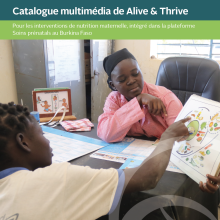Toolkit
Oct 23 2023

Catalogue multimédia de Alive & Thrive pour les interventions de nutrition maternelle
Alive & Thrive a mené une recherche formative pour mieux comprendre les déterminants, les facilitateurs et les obstacles à l’adoption d’interventions de nutrition maternelle pour les femmes enceintes et leurs nourrissons en Burkina Faso.
Journal article
Jul 20 2023

Intensified Nutrition Interventions in Antenatal Care Services Increased Consumption of Iron and Folic Acid Supplements and Early Breastfeeding Practices in Burkina Faso (Kim SS, Zagré RR, et al. The Journal of Nutrition. 2023)
Adequate maternal nutrition is essential for maternal and infant health, particularly as a major determinant of pregnancy outcomes.
Journal article
Jun 14 2023

Comprehensive Approach for Improving Adherence to Prenatal Iron and Folic Acid Supplements Based on Intervention Studies in Bangladesh, Burkina Faso, Ethiopia, and India (Sanghvi T, Nguyen PH, et al. Food and Nutrition Bulletin. 2023)
Anemia remains a critical maternal nutrition issue in low- and middle-income countries. Literature search, formative research and baseline surveys, informed the design of interventions to improve adherence to iron and folic acid supplementation in Bangladesh, Burkina Faso, Ethiopia and India.
Journal article
Feb 07 2023

Marketing of commercial milk formula: a system to capture parents, communities, science, and policy (Rollins N, Piwoz E, Zambrano P, et al, The Lancet. 2023)
Despite proven benefits, less than half of infants and young children globally are breastfed in accordance with the recommendations of WHO.
Journal article
Feb 07 2023

Breastfeeding: crucially important, but increasingly challenged in a market-driven world (Pérez-Escamilla R, Tomori C, et al, The Lancet. 2023)
This Series paper examines how mother and baby attributes at the individual level interact with breastfeeding determinants at other levels, how these interactions drive breastfeeding outcomes, and what policies and interventions are necessary to achieve optimal breastfeeding.
Journal article
Feb 07 2023

The political economy of infant and young child feeding: confronting corporate power, overcoming structural barriers, and accelerating progress (Baker P, Smith JP, et al, The Lancet. 2023)
Despite increasing evidence about the value and importance of breastfeeding, less than half of the world's infants and young children (aged 0–36 months) are breastfed as recommended. This Series paper examines the social, political, and economic reasons for this problem.

